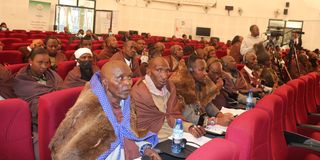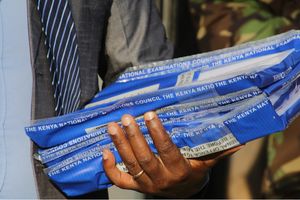Two court judgments later, justice remains elusive for the Ogiek

Members of the Ogiek community at the African Court on Human and People's Rights in Arusha,Tanzania on June 23. The Ogiek have been awarded Sh157million by the court, in a land rights case they filed.
Though the Ogiek community is armed with two landmark judgments from the African Court on Human and People's Rights in Arusha, Tanzania, securing justice remains elusive.
Less than two months before the next General Election, the community's hopes of having the two judgements implemented by the State are in limbo.
In the latest judgment, on June 23, the African court in Arusha awarded the Ogiek Sh157 million in a land rights case they had filed.
The court dismissed objections from the government of Kenya and ordered the State to recognise, respect, give reparations and compensate the community to the tune of Sh57 million for material damages and Sh100 million for moral damages.
"The court hereby orders the respondent State to take the necessary administrative, legislative and any other measures to establish this fund within 12 months of the notification of this judgment,” read the judgment.
The court said comprehensive reparations should take into account harm suffered by the Ogiek in relation to the infringement of their rights.
"This court has confirmed that there was moral prejudice, suffering and distress caused to members of the Ogiek community. It therefore dismisses the objections by the State to compensate the members of the community," the judges wrote.
The government had asked the court to allow it to consider ordering an amicable settlement of the matter, which the court dismissed.
"In the application before this court, given the failure of an amicable settlement procedure at the merits stage, and also the parties’ failure to agree on the procedure at the reparations stage, the court held that the conditions for an amicable settlement were not satisfied. The respondent state’s prayer is therefore dismissed,” the ruling read.
The government had opposed the Ogiek’s request for the return of their ancestral land in the Mau forest by means of delimitation, demarcation and titling, noting that the community had misinterpreted the findings of an earlier court judgment in 2017 in relation to the ownership of the Ogiek ancestral land.
The judgment comes years after the May 26, 2017 landmark ruling that ordered the Kenyan government “to take all appropriate measures within a reasonable time frame to remedy all the violations against the community”.
But five years later, the Ogiek are still waiting for the implementation of that judgment.
The Ogiek are now caught between unresolved historical injustices that include a bid to regain their ancestral land and a push to protect a fast-fading culture.
Mr Daniel Kobei, the executive director of the Ogiek Peoples' Development Programme (OPDP), a Kenyan-based NGO that has been fighting for the rights of the community, justice for the Ogiek has been delayed and remains elusive.
"We urge the next President to prioritise implementation of the two landmark judgments and ensure they are implemented fully,” Mr Kobei said.
“We need back our land, which extends over 21 government forest blocks and the Maasai Trust Land forest that makes up the Mau complex. Once resettled, we shall protect and take care of the Mau forest water tower through community forest protection associations.”
Mr Kobei wants the government to give the Ogiek land and title deeds so as to end frequent land conflicts in areas the community occupies.
Mr Kobei said incessant land disputes in areas occupied by the community have been the source of frequent conflicts between communities bordering the Mau forest complex.
Members of the Ogiek interviewed by the Nation also said they want the government to resettle them in their ancestral land in the Mau forest and issue them with a general title deed for the entire community so that they can improve the quality of their lives.
"The Ogiek have lived an impoverished life and most live one day at a time on land with a caveat and without title deeds. Members of the community cannot engage in any development as they do not own land," said elder Joseph Towett.
"They have never experienced peace of mind since they were ejected from their ancestral land, the Mau forest.”

Members of the Ogiek community at the African Court on Human and People's Rights in Arusha,Tanzania on June 23.
The Ogiek say the community has lagged economically due to historical injustices such as loss of its ancestral land.
"We want back our ancestral land. We deserve to be treated like the rest of Kenyans and be given our land. We have suffered for a long time because we do not have title deeds for our land,” said Mrs Jennifer Cheruiyot, a resident of Marioshoni, Nakuru County.
“A caveat was placed on the land here. We therefore cannot secure loans or build permanent structures on this land.”
Meanwhile, the Ogiek are also fighting to protect their culture, including language and sacred places and recognise the community as a distinct tribe to avoid assimilation.
"We request the government to intervene and safeguard the dignity of our community as one of the more than 40 tribes in Kenya," said Ms Margaret Kipkemoi, an Ogiek from Nessuit in Nakuru County.
They say evictions from the forest undermined their traditional, religious and cultural life.
The forest dwellers survived mainly on wild fruits and roots, game hunting and traditional beekeeping.
The community also wants proper representation in the county and national governments.
"We demand more representation and empowerment of the community through education. The only leader we had was the late Senator Victor Prengei, who died in a road accident,” said Mr Peter Kiplangat, a member of the community.
After a nearly five-year court battle, the African court in Arusha on May, 26, 2017 ruled that the Kenyan government had violated the rights of the Ogiek people by repeatedly evicting them from their ancestral lands in the Mau forest.
The judgment, which found that the government had broken seven of 68 articles of the African Charter on Human and Peoples’ Rights, ordered the government to take remedial action.
The court found that the 35,000-member forest-dwelling community were illegally evicted from their ancestral land in the water catchment tower and that their rights were violated.
The government, which has been fighting encroachment onto water catchment areas, has seemingly appeared reluctant to implement the court’s verdicts.
The government had stepped up a bid to evict illegal settlers from the Mau forest cince 2018, before the bid was stopped by the courts.
Environment and Forestry Cabinet Secretary Keriako Tobiko has repeatedly said that the state would not be intimidated or derailed in its efforts to remove illegal encroachers from the Mau forest complex.
The government's bid to resolve perennial land disputes in the Eastern Mau forest in 2020 and implement the 2017 landmark judgment ran into headwinds after the Ogiek opposed the move.
The process suffered a setback on December 17, 2020 after the Environment and Land Court temporarily stopped the planned issuing of title deeds. The Ogiek, through its council of elders, moved to court, protesting against a multi-agency team set up to conduct the process, saying there was no proper consultation.
They argued that the process contravened the judgment by the Arusha court that recognised them as the indigenous forest dwellers entitled to the forest.
Justice John Mutungi, in his ruling, directed that the process be halted to allow for consultations between the parties.
Mr Kobei, who opposed the move, said they want the government to rely on the judgment to resettle members of the community in the Eastern Mau.
Mr Kobei argued that the process was shrouded in secrecy and that local leaders had not been involved.
"We will not allow the multi-agency team to undermine the rights of the Ogiek people anymore. We want the Arusha landmark judgment implemented,” said Mr Kobei.
The lawsuit derailed the process, whose aim was to restore sanity in the region that has been hit by perennial land conflicts.
The Ogiek, through council of elders chairman John Sironga, also opposed the process, which they claimed was shrouded in secrecy.
President Uhuru Kenyatta had directed that the multi-agency team, formed by Interior Cabinet Secretary Fred Matiang'i to resolve the disputes, complete its mandate by December 2020 to pave the way for the issuing title deeds to residents.
But that flopped after the Ogiek withdrew from the process, citing dishonesty among State officials.





